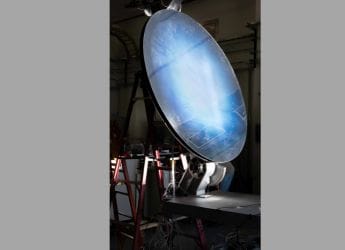- Home
- Science
- Science News
- Improved Acoustic Tweezers Can Levitate, Move Objects Without Physical Contact Using Sound Waves
Improved Acoustic Tweezers Can Levitate, Move Objects Without Physical Contact Using Sound Waves
By using adaptive switching, the researchers could make use of both the in-phase and the out-of-phase and execute a more stable and well-controlled lift.

Photo Credit: Tokyo Metropolitan University
A hemispherical array of ultrasound transducers was used to set up fields of sound pressure
Researchers have successfully developed 'acoustic tweezers' that enable objects to be moved and levitated using just sound waves. While the team lifted small polystyrene balls off a reflective surface without having any physical contact with it, they could not achieve the desired stability. Fine-tuning their technology, the team claims they have crossed that hurdle. Using an adaptive algorithm and further miniaturisation, engineers have succeded in making the technology more stable. With the improvement, the team hopes to find practical use of the technology in space and in developing futuristic technology.
Sound waves can exert physical force — you might have experienced this effect while standing near a loudspeaker. If speakers are arranged the right way and the right frequency and amplitude are achieved, then it allows for superimposing of the waves and creating a field of influence. This field in turn helps move, push, or lift objects in a completely contactless and contamination-free manner.
Researchers from the Tokyo Metropolitan University used a hemispherical array of ultrasound transducers to set up fields of sound pressure and lift millimetre-sized particles using it. The transducers were driven individually using a unique algorithm that helped in the experiment. However, the acoustic tweezers lacked stability which the researcher aimed at achieving in their new study.
The team has now developed enhancements in the technology. They realised that the transducers can be driven in two modes. These are the in-phase and the out-of-phase. They noted that distinct phases are better at doing certain tasks. The in-phase mode is better at lifting and moving the object close to the surface and targeting individual particles that are just a centimetre apart. The out-of-phase mode, meanwhile, was found to be efficient in bringing the lifted particle to the centre of the hemispherical array.
The team observed that by using adaptive switching, they can make use of both the modes and execute a more stable and well-controlled lift than before. Now, they hope that the technology will pave way for the development of futuristic technology and might find practical applications in space.
The research has been published in the Japanese Journal of Applied Physics.
Get your daily dose of tech news, reviews, and insights, in under 80 characters on Gadgets 360 Turbo. Connect with fellow tech lovers on our Forum. Follow us on X, Facebook, WhatsApp, Threads and Google News for instant updates. Catch all the action on our YouTube channel.
- Samsung Galaxy Unpacked 2026
- iPhone 17 Pro Max
- ChatGPT
- iOS 26
- Laptop Under 50000
- Smartwatch Under 10000
- Apple Vision Pro
- Oneplus 12
- OnePlus Nord CE 3 Lite 5G
- iPhone 13
- Xiaomi 14 Pro
- Oppo Find N3
- Tecno Spark Go (2023)
- Realme V30
- Best Phones Under 25000
- Samsung Galaxy S24 Series
- Cryptocurrency
- iQoo 12
- Samsung Galaxy S24 Ultra
- Giottus
- Samsung Galaxy Z Flip 5
- Apple 'Scary Fast'
- Housefull 5
- GoPro Hero 12 Black Review
- Invincible Season 2
- JioGlass
- HD Ready TV
- Latest Mobile Phones
- Compare Phones
- Leica Leitzphone
- Samsung Galaxy S26+
- Samsung Galaxy S26 Ultra
- Samsung Galaxy S26
- iQOO 15R
- Realme P4 Lite
- Vivo V70
- Vivo V70 Elite
- Asus TUF Gaming A14 (2026)
- Asus ProArt GoPro Edition
- Huawei MatePad Mini
- Infinix Xpad 30E
- Huawei Watch GT Runner 2
- Amazfit Active 3 Premium
- Xiaomi QLED TV X Pro 75
- Haier H5E Series
- Asus ROG Ally
- Nintendo Switch Lite
- Haier 1.6 Ton 5 Star Inverter Split AC (HSU19G-MZAID5BN-INV)
- Haier 1.6 Ton 5 Star Inverter Split AC (HSU19G-MZAIM5BN-INV)












